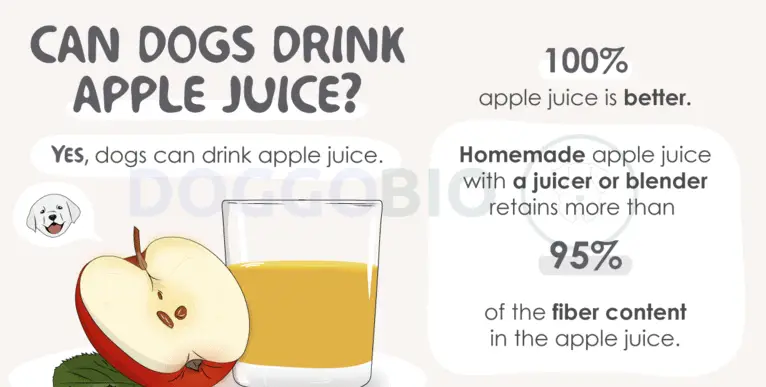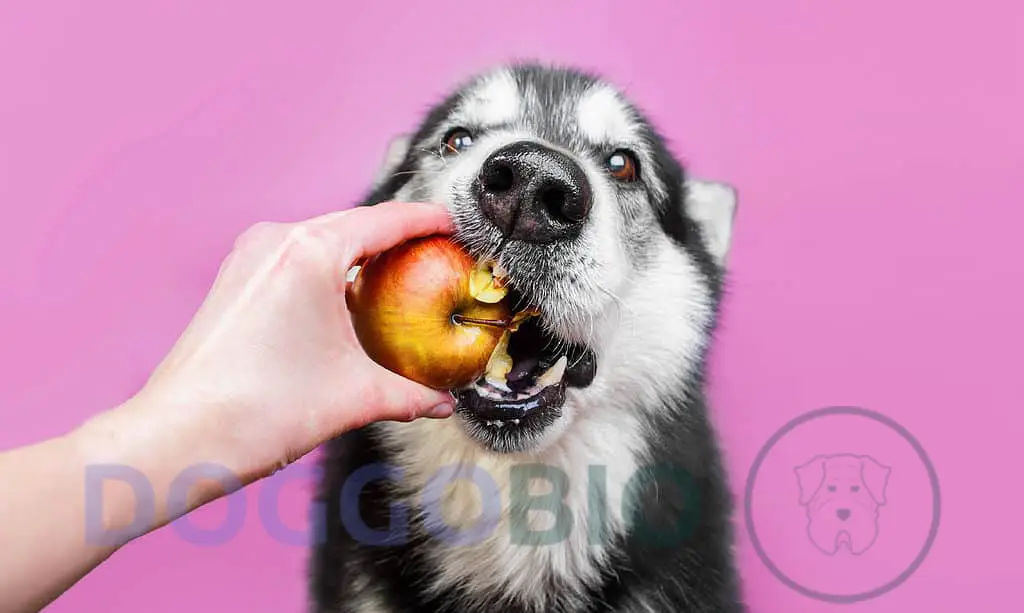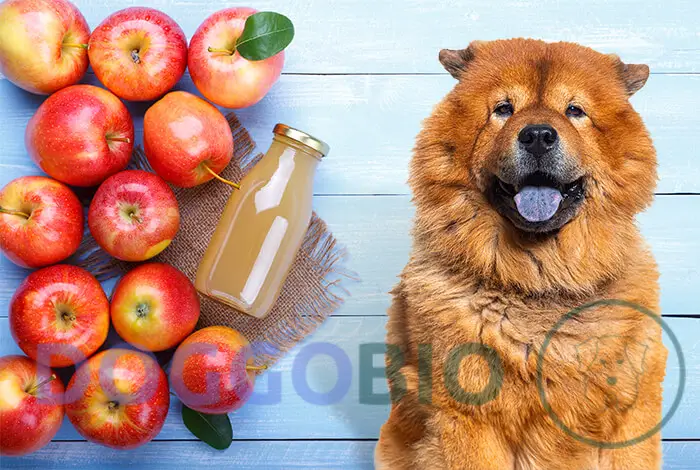As pet owners, we often wonder about the safety of various human foods and drinks regarding our furry friends. One common question arises: “Can dogs drink apple juice?” The short answer is yes, dogs can drink apple juice, but there are essential considerations to remember.
This article delves into the nuances of offering dogs apple juice, exploring the potential benefits and risks associated with this seemingly simple treat. We’ll examine the nutritional aspects of apple juice, how it affects a dog’s health, and provide guidelines to ensure that if you share this fruity beverage with your canine companion, it’s done safely and in moderation.
Can Dogs Drink Apple Juice?
Yes, dogs can drink apple juice with caution and in moderation.
Store-bought apple juice is generally not recommended for dogs due to additives like fructose corn syrup, sodium, spices, and fruit juice concentrates. These additives can lead to gastrointestinal upset and other health issues in dogs.

Free from these additives, homemade apple juice can be a safer option for dogs. However, it should still be given in moderation because of its natural sugar content, which can be excessive for dogs if consumed in large amounts. Excessive sugar intake can lead to dental problems, obesity, and diabetes in dogs. Therefore, while dogs can have apple juice, it should be an occasional treat, not a regular diet.
The Nutritional Value of Apple Juice for Dogs
Apple juice is made from the liquid extracted from apples, known for its high levels of vitamins A, C, and K, as well as potassium and fiber. These nutrients are essential for maintaining a healthy immune system, promoting digestion, and supporting overall health.
However, when it comes to dogs, their nutritional needs are different from those of humans. While apples and apple juice may provide some benefits, they should not be considered a staple in a dog’s diet. Dogs require a balanced diet specifically formulated for their species, and too much of any one food can lead to health issues.
Can Dogs Eat Apples?

Yes, dogs can eat apples in moderation.
Apples are often recommended as a healthy dog snack due to their low-calorie and high-fiber content. They can help promote good digestion and even freshen your dog’s breath. Additionally, apples contain antioxidants that help boost your dog’s immune system and protect against diseases.
However, it’s important to note that these benefits come from feeding your dog small amounts of fresh, raw apples. When apples are turned into juice, they lose nutritional value and can even harm dogs.
Why Can Dogs Have Apples But Not Apple Juice?
While apples can be a healthy dog snack, apple juice is not recommended. The main reason is that most store-bought apple juices contain added sugars and preservatives, which can harm dogs. These additives can cause digestive issues, weight gain, and even tooth decay in dogs.
Moreover, apple juice is high in natural sugars, which can lead to an increase in blood sugar levels and potentially cause health problems for dogs with diabetes or other underlying health conditions. Additionally, too much sugar can also lead to obesity in dogs, which can have severe consequences for their overall health and well-being.
Primary Concerns Regarding Dogs Consuming Apple Juice

1. Sugar content
Apple juice, especially store-bought varieties, is high in sugar. This can lead to a rapid spike in a dog’s blood sugar levels, potentially causing health issues like diabetes, weight gain, and even pancreatitis in severe cases.
2. Natural and added flavors
While appealing to humans, the flavors and spices added to apple juice can upset a dog’s stomach. These additives are not part of a dog’s natural diet and can cause gastrointestinal distress.
3. Toxic substances (e.g., seeds, stems)
While apple flesh is safe, the seeds and stems can be harmful. Apple juice might not typically contain these parts, but the lack of regulation in juice production raises concerns about potential contamination.
The Potential Risks Associated With Dogs Drinking Apple Juice
Can Dogs Eat Apples?
1. Gastrointestinal issues
The high sugar and additive content in apple juice can lead to stomach upset, diarrhea, and vomiting in dogs.
2. Weight gain and obesity
Regular consumption of sugary apple juice can contribute to unhealthy weight gain and obesity in dogs, leading to various related health issues.
3. Dental problems
Like humans, high sugar in a dog’s diet can lead to dental problems like cavities and tooth decay.
Alternative Ways To Give Apples To Dogs
If you’re looking for ways to incorporate apples into your dog’s diet, there are safer alternatives than apple juice. One option is to give your dog small pieces of fresh, raw apples as a treat. Remove the seeds and core, as they can be a choking hazard and may contain trace amounts of cyanide.
Another option is to mix small amounts of unsweetened applesauce into your dog’s food. This can add flavor and nutrients without the added sugars and preservatives in apple juice.
Some Posts You Wanna Read More
- What Can Dogs Drink Besides Water?
- Can Dogs Drink Tea?
- Can Dogs Drink Ensure?
- Can Dogs Drink Soda?
- Can Dogs Drink Yakult?
- Can Dogs Drink Sparkling Water?
- How Long Can A Dog Go Without Water?
- How long Can A Puppy Go Without Eating Or Drinking?
Frequently Ask Questions
Can Apple Juice Help With My Dog’s Digestion?
No, apple juice is not recommended for dogs with digestive issues. It can make their symptoms worse due to the high sugar content and potential additives.
Can Apple Juice Be Used As A Substitute For Water?
No, water is the best and safest option for hydrating your dog. Apple juice should not be given to dogs as a substitute for water.
Can Apple Juice Help With My Dog’s Bad Breath?
While apples can help freshen your dog’s breath, apple juice is not recommended. The added sugars and preservatives in apple juice can contribute to bad breath in dogs.
Can Apple Juice Be Harmful To Puppies?
Yes, apple juice can harm puppies, just like it can harm adult dogs. Puppies have even more sensitive digestive systems and should only be given human food or drink after consulting a veterinarian.
Can Dogs Drink Apple Cider?
No, dogs should not drink apple cider due to the spices and sugar content, which can upset their stomach and even be a bladder irritant.
What Human Food Can Dogs Eat?
Dogs can safely eat human foods like carrots, green beans, white rice, dairy products in small amounts, fish, chicken, and peanut butter without xylitol.
Conclusion
In conclusion, “Can Dogs Drink Apple Juice?” has a nuanced answer. While dogs can safely consume apple juice in small quantities, pet owners must approach this treat cautiously. Although not harmful in moderation, the natural sugars and acids in apple juice can lead to health issues if consumed excessively. Opting for pure, unsweetened apple juice and introducing it into your dog’s diet gradually is always advisable, monitoring for any adverse reactions.
Remember, the key is moderation and understanding your dog’s health needs. Always consult your veterinarian if you have any concerns or questions about introducing new foods or drinks into your dog’s diet. Ultimately, while apple juice can be a safe occasional treat, it should never replace water as your dog’s primary hydration source.

Pingback: What Can Dogs Drink Besides Water? Essential Alternative 2024
Pingback: Can Dogs Drink Peppermint Tea? Handbook To The Owner 2024
Pingback: Can Dogs Drink Ensure? Safety Tips and Insights 2024
Pingback: Can Dogs Drink Yakult? Surprising Benefits & Safety Tips! 2024
Pingback: How Long Can A Dog Go Without Water? 2024